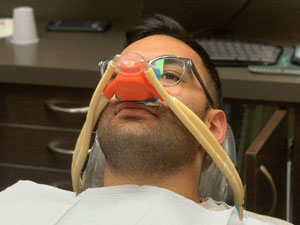Endodontics
What Is Root Canal Therapy?

Root canal therapy (endodontics) treats disorders of the nerve(pulp) of the tooth. It used to be that a tooth with a diseased or infected nerve had to be removed. However, this is no longer true. We believe in saving teeth instead of removing them and we will make every effort to save yours.
Why Do I Need A Root Canal?
- Trauma: a physical blow to a tooth or a constant striking in the opposite jaw that traumatizes the tooth.
- Physical irritation: deep decay or a very large filling. Regardless of the initial cause, the tooth pulp becomes irritated and an abscess (infection) occurs. Bacteria from your saliva grow within the tooth pulp, causing pressure and pain. Eventually the pulp dies, causing the bone around the tooth to be destroyed.
What's Going To Happen?
Once it has been determined (with X-rays and clinical examination) that root canal treatment is necessary, you will be scheduled for one or more appointments. It's important that you keep these appointments, in order to prevent delays in treatment and healing. It s also essential that you take all antibiotics and medications prescribed so as to hasten healing and reduce swelling.- First, after anesthesia is administered,the tooth may be isolated with a piece of rubber dam. This confines the treatment area and protects the mouth from bacteria and chemical agents. An opening is made through the tooth into the pulp.
- We then carefully remove the diseased pulp. The root canal area inside your tooth is cleaned, enlarged and shaped.
- Throughout the root canal procedure we take X-rays to ensure that all of the infected pulp is removed and that the walls inside the canal are smooth.
The root canal and pulp chamber are permanently filled and sealed.
Care Following Treatment
Once the root canal treatment has been completed, yon should be aware of the following considerations:- Discoloration: You may notice that your endodontically treated tooth (particularly a front tooth) has undergone a change in color.
- Brittleness: A non-vital (endodontically treated) tooth is more brittle than a vital one and is more susceptible to fracture. Therefore, we recommend that your root canal tooth be crowned (capped) following treatment.
We will make every effort to ensure your comfort during root canal treatment. We are happy to answer any questions you may have and our concern is your comfort and confidence. Our goal is to help preserve your natural teeth for a lifetime. We believe in saving teeth and we will make every effort to save yours!
